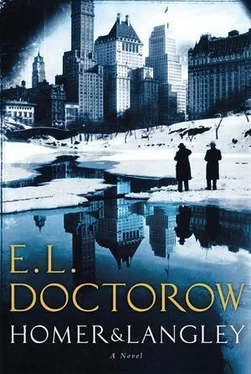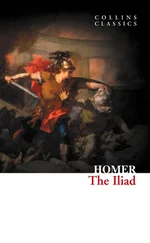Soon we were discussing other trade names — Baker, Cooper, Farmer, Miller — and mulling over of the turnings of history in such names, and that was the end of our financial conference.
Langley would eventually agree with me and pay off the mortgage but by that time we were famous throughout the city and he was followed to the bank by newspaper reporters, and a photographer for the Daily News , who would win a Pulitzer Prize for his portrait of Langley shuffling down Fifth Avenue in a porkpie hat, a ragged coat down to his ankles, a shawl he’d made from a burlap sack, and house slippers.
I WILL SAY IN MY brother’s defense that he had a lot on his mind. It was a period of appalling human behavior — for instance the bombing of the Baptist church down south in which four little black girls were killed while at Sunday school. The news left him distraught — there were occasions, you see, when his cynicism broke down and the heart was made visible. But the monstrousness of what had happened revealed to him yet another category of seminal events for his ultimate newspaper — the murder of innocents, not only for those little girls, but for the shooting down of college students, and for the slaying of young men registering people to vote, in that same appalling period. And then of course he had to open a file for political assassinations — we had had three or four of those — and perhaps a file for the mass detention of hundreds of street demonstrators in an outside pen in Washington. He couldn’t decide if that event should be incorporated into the category of club-on-the-head police conduct as applied to antiwar demonstrators in other cities, or whether it was something different.
Langley’s dream newspaper could not be mere reportage, its single edition for all time demanded a painfully categorical account of what we are given to habitually as a specie. So it was a big organizational problem for him to cull from years of daily newspapers the signal episodes and kinds of activities that are timeless.
He would be tested in the years following: he told me one day about the mass suicide of nine hundred people living in a small South American country I had never heard of before. They were Americans who had fled there to live in rows of shacks which their leader proposed to them as an idealistic Communist paradise. They had practiced suicide by drinking a harmless red liquid in lieu of poison, but when it came time that their leader said they could no longer tolerate the repression of the outside world, they did not hesitate to swallow the real thing. All nine hundred of them. I asked Langley, Where do you put this event? He said he thought at first to file it under Fashion, as when everybody is all at once wearing the new color. Or when the same slang word is suddenly on everybody’s lips. But finally, he said, I’ve put it in a pending file of one-of-a-kind headline events. There it must stay awaiting another episode of insane lemminglike behavior to pop up again. As I suspect it will, he added.
Presidential malfeasance in these years was another entry for his conditional file. Until another president subverted the Constitution he was sworn to uphold, it couldn’t be considered as seminal. But I’m waiting, he said.
ONE DAY MY BROTHER came in with his morning papers and without saying a word he went to the windows and began pulling the shutters together and locking them. I heard the banging of the shutters slamming in place like heavy doors and watched the patina of lighter darkness receding from my eyes. The house air became cooler. A strange strangled sound came from my brother’s throat that I only slowly realized was his effort not to break down.
An awful feeling, a constriction of the heart, caused me to rise from my piano bench. What is it? I said.
He read to me: The bodies of four American nuns in a remote Central American village had been found in shallow graves. They had been raped and shot to death. Their names had not yet been released.
I didn’t want to believe what I knew. I insisted that without the names we couldn’t be sure that Mary Elizabeth Riordan was one of the nuns.
Langley climbed upstairs and found the little tin box where we kept her letters. She had written us from time to time as her order moved her about the world: she had gone from one African country to another, and then to South Asian countries and, after some years, to villages in Central America. The letters were always the same wherever she was, as if she was on a world tour of destitution and death. Dear friends, she had written in her last letter, I am here in this bereft little country torn by civil war. Just last week soldiers came through and took away several men of the village and killed them for being with the insurgency. They were only poor farmers trying to feed their families. It is only old men, women, and children now. They cry out in their sleep. Three of my sisters are here with me. We provide what solace we can.
The letter had been written a few months before from the same village named in the newspaper.
I AM NOT A religious person. I prayed to be forgiven for having been jealous of her calling, for having longed for her, for having despoiled her in my dreams. But in truth I have to admit that I was numbed enough by this awful fate of the sister to be not quite able to connect it with my piano student Mary Elizabeth Riordan. Even now, I have the clean scent of her as we sit together on the piano bench. I can summon that up at will. She speaks softly in my ear as, night after night, the moving pictures roll by: Here it’s a funny chase with people hanging out of cars … here the hero is riding a horse at a gallop … here firemen are sliding down a pole … and here (I feel her hand on my shoulder) the lovers embrace, they’re looking into each other’s eyes, and now the card says … “I love you.”
—
AFTER SOME DAYS of silence in our house I said to Langley: This is martyrdom, this is what martyrdom is.
Why, said Langley, because they were nuns? Martyrdom is a religious invention. If it isn’t, why do you not say the four little girls murdered in their Sunday school in Birmingham are martyrs?
I thought about this. I could see the possibility that the sister would have forgiven her abuser and touched his face with two fingers as he brought his gun up to her temple.
There is a difference, I said. The nuns’ religious beliefs put them in harm’s way. They knew there was a civil war, that armed savages roamed the land.
You idiot! Langley shouted. Who do you think armed them! They’re our savages!
But now I am not sure when all of this happened. Either my mind is turning in on itself and its memories are eliding, or I have finally understood the prophecy of Langley’s timeless newspaper.
OUR SHUTTERS WERE never again to be opened. Langley made arrangements with the newsstand where he got his papers to have them delivered to our front door. The early editions of the morning papers arrived usually at about eleven at night. The evening papers were left at our door by three in the afternoon. When Langley did go out, it was always at night. He did our marketing at a small grocery store that had opened just a few blocks north of us and that sold day-old bread. He made a point of patronizing this store, of buying more than we needed, actually, because a local free newspaper that covered embassy receptions, and fashion shows, and ran interviews with interior decorators reported that the store owner was Hispanic. My heavens, Langley shouted, run for your lives, they’re here!
In truth that was one sign of a changing city — a slow, almost imperceptible lapping of a tide from the north — but something like a little grocery store, or a couple of Negro faces seen on the street, was enough for our neighbors to throw up their hands. And, of course, inevitably, my brother and I were deemed the First Cause — it was the Collyers, to the manner born, who had fomented this disaster. Whatever animosity had been directed at us since the fire in our backyard — no: that had been building since the time of our tea dances — was now in full cry.
Читать дальше












